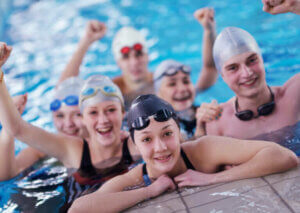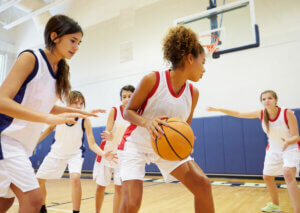What's the Importance of Sports in Adolescence?

One of the hottest topics in the news is the importance of sports in adolescence. During this stage of change and development, maintaining an active lifestyle is essential to develop properly.
Exercise is very important at all stages, but during adolescence, it has an added value. In fact, this is because sports can enhance people’s physical and mental health. In addition, if you play a team sport, you strengthen social ties.
Although doing sports at this stage is very important, teenagers don’t always want to. In school, other subjects are often given more importance, and physical education is pushed to the side.
However, both types of subjects can be complemented and supported, since physical exercise positively influences academic performance. For all of these reasons, we’ll talk about the importance of sports in adolescence.
Increase self-esteem and improve self-concept: sports in adolescence
During adolescence, major changes occur in teenagers’ physique. It’s normal for teens to feel uncomfortable in their bodies. In fact, until they’re done developing, they might not feel comfortable with their physical appearance.
Playing sports during this stage can improve the adolescent’s opinion of himself. According to a study by the University of the Balearic Islands, exercise is positively related to physical self-concept. In other words, active teens have better perceptions of their bodies compared to those with sedentary lifestyles.
On the other hand, sports also help to improve self-confidence. This is because the person realizes he can reach the goals he sets, and that his actions cause positive changes in his health.

Strengthen peer relationships
When you’re a teenager, peers and friends take on special importance. For teens, their friends are their point of reference and the people they turn to when there are problems.
Sports not only influence the physical and mental well-being of a person, but they also help to build strong and lasting relationships. Playing sports with others is a great way to meet people with similar interests.
In addition, for team sports, it’s also a great way of learning how to collaborate with others to achieve a common goal.
Positive changes in self-control
If there’s something that characterizes adolescents, it’s impulsivity and the inability to plan for the long term. This way of being has an explanation: the prefrontal cortex, the area responsible for the initiation, control and maintenance of behavior, hasn’t finished maturing.
This brain region completes its development in early adulthood. Despite this, all isn’t lost: it’s been proven that practicing martial arts increases the capacity for self-control within the limitations of age. People with good self-control are also efficient at regulating their emotions and staying calm in high-pressure situations.
Sports in adolescence: boost academic performance
Many athletes are forced to choose between studies and sports, but the reality is that you can choose both. In addition, sports have many benefits for the cognitive abilities that are involved in school performance.

After exercising, blood flow to the brain increases. As a consequence, there’s more blood flow and activation, which enhances brain processes like attention and memory.
For this reason, being sufficiently activated is essential to performing well in school. Increasing school hours for physical activity or promoting programs that emphasize an active lifestyle could be effective ways to improve grades for many students.
Sports in adolescence is a safe bet
The adolescence stage is characterized by increased autonomy and the desire to discover oneself. The decisions you make during this time will affect adulthood. Therefore, it’s important to raise awareness about the importance of sports in adolescence.
Sports positively influence the physical and mental health of people, but it can also help teens socialize and learn. So, we should promote physical activity in this age group by giving opportunities for them to choose activities that interest them. Also, it doesn’t matter if they choose an individual or a team sport. What really matters is that they commit to their health.
One of the hottest topics in the news is the importance of sports in adolescence. During this stage of change and development, maintaining an active lifestyle is essential to develop properly.
Exercise is very important at all stages, but during adolescence, it has an added value. In fact, this is because sports can enhance people’s physical and mental health. In addition, if you play a team sport, you strengthen social ties.
Although doing sports at this stage is very important, teenagers don’t always want to. In school, other subjects are often given more importance, and physical education is pushed to the side.
However, both types of subjects can be complemented and supported, since physical exercise positively influences academic performance. For all of these reasons, we’ll talk about the importance of sports in adolescence.
Increase self-esteem and improve self-concept: sports in adolescence
During adolescence, major changes occur in teenagers’ physique. It’s normal for teens to feel uncomfortable in their bodies. In fact, until they’re done developing, they might not feel comfortable with their physical appearance.
Playing sports during this stage can improve the adolescent’s opinion of himself. According to a study by the University of the Balearic Islands, exercise is positively related to physical self-concept. In other words, active teens have better perceptions of their bodies compared to those with sedentary lifestyles.
On the other hand, sports also help to improve self-confidence. This is because the person realizes he can reach the goals he sets, and that his actions cause positive changes in his health.

Strengthen peer relationships
When you’re a teenager, peers and friends take on special importance. For teens, their friends are their point of reference and the people they turn to when there are problems.
Sports not only influence the physical and mental well-being of a person, but they also help to build strong and lasting relationships. Playing sports with others is a great way to meet people with similar interests.
In addition, for team sports, it’s also a great way of learning how to collaborate with others to achieve a common goal.
Positive changes in self-control
If there’s something that characterizes adolescents, it’s impulsivity and the inability to plan for the long term. This way of being has an explanation: the prefrontal cortex, the area responsible for the initiation, control and maintenance of behavior, hasn’t finished maturing.
This brain region completes its development in early adulthood. Despite this, all isn’t lost: it’s been proven that practicing martial arts increases the capacity for self-control within the limitations of age. People with good self-control are also efficient at regulating their emotions and staying calm in high-pressure situations.
Sports in adolescence: boost academic performance
Many athletes are forced to choose between studies and sports, but the reality is that you can choose both. In addition, sports have many benefits for the cognitive abilities that are involved in school performance.

After exercising, blood flow to the brain increases. As a consequence, there’s more blood flow and activation, which enhances brain processes like attention and memory.
For this reason, being sufficiently activated is essential to performing well in school. Increasing school hours for physical activity or promoting programs that emphasize an active lifestyle could be effective ways to improve grades for many students.
Sports in adolescence is a safe bet
The adolescence stage is characterized by increased autonomy and the desire to discover oneself. The decisions you make during this time will affect adulthood. Therefore, it’s important to raise awareness about the importance of sports in adolescence.
Sports positively influence the physical and mental health of people, but it can also help teens socialize and learn. So, we should promote physical activity in this age group by giving opportunities for them to choose activities that interest them. Also, it doesn’t matter if they choose an individual or a team sport. What really matters is that they commit to their health.
All cited sources were thoroughly reviewed by our team to ensure their quality, reliability, currency, and validity. The bibliography of this article was considered reliable and of academic or scientific accuracy.
-
Contreras, O. R., Fernández, J. G., García, L. M., Palou, P., y Ponseti, J. (2010). El autoconcepto físico y su relación con la práctica deportiva en estudiantes adolescentes. Revista de Psicología del Deporte, 19(1), 23-39.
-
Orozco-Calderón, G. (2015). Cerebro y artes marciales: beneficios, riesgos e intervención neuropsicológica. Ciencia & Futuro, 5(4), 142-156.
This text is provided for informational purposes only and does not replace consultation with a professional. If in doubt, consult your specialist.








